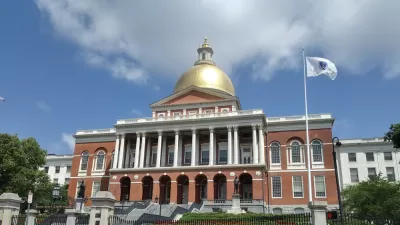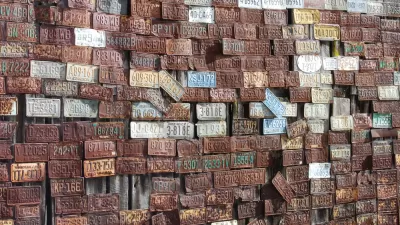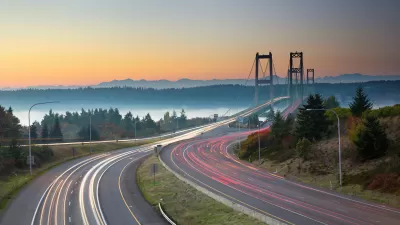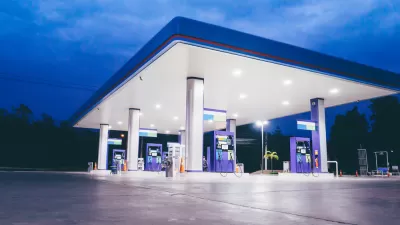The Democratic House just passed a gas tax increase that the Republican governor opposes because he wants his state to join the Transportation and Climate Initiative, a carbon pricing program applicable to fuel. Both measures will fund transit.

Complex politics are playing out in the Bay State between the Democratically-controlled legislature and Gov. Charlie Baker, a Republican who endorses a carbon pricing program being advanced by the 12-state plus District of Columbia collaborative known as the Transportation & Climate Initiative (TCI).
"The Massachusetts House of Representatives approved a major tax bill Wednesday [March 4] night that Democratic leaders say will generate more than half a billion dollars for transportation infrastructure by increasing taxes or fees on gasoline, corporations, ride-hailing services, and vehicle purchases by rental car companies," reports Chris Lisinski of State House News Service.
House Speaker Robert DeLeo and other elected officials had pledged since last year that they would take action to raise new revenue for transportation, hoping to revitalize the aging and unreliable MBTA system, inject more money into road maintenance, and offer greater support to regional transit authorities.
Under the bill (H 4508), which Democratic leaders project will bring in $522 million to $612 million per year, the state’s 24-cents-per-gallon gasoline and diesel taxes [pdf[] would increase by 5 cents and 9 cents, respectively.
Gas taxes vs. the Transportation & Climate Initiative
As posted earlier, governors of the 12 states have been slow to embrace the regional climate pact to reduce transportation emissions because of the likely impact on fuel prices, with Gov. Baker and Rhode Island Governor Gina Raimondo (D) the likely exceptions.
"Just raising the state gas tax won’t create a reason for the auto and gas industry to address carbon emissions or greenhouse gas emissions, the governor said during a WGBH radio interview last week," wrote Michael P. Norton, also for State House News Service, on Jan 31, 2020.
“They just pass it through to the customer and the customer pays it,” Baker said during his “Ask the Governor” segment on Jan. 22.
“Putting a tax on something is not the same as creating a cap and invest program,” Baker said.
Baker is referring to the TCI's funding mechanism that would require fuel suppliers to purchase carbon allowances based on the carbon emissions that occur when the fuel is burned in internal combustion vehicles. Carbon emissions would be capped, and then lowered in time in order to achieve emission-reduction targets, ensuring that the carbon allowances would become costlier in time. [See 2-page fact sheet (pdf)]. Fuel suppliers would likely pass on the cost of the carbon allowances to gas-burning motorists.
As for the "invest" part, "Half of the money raised through the [TCI] fees would go toward Baker’s $18 billion transportation bond bill, which includes major investments in the beleaguered Massachusetts Bay Transportation Authority (MBTA)," according to an earlier post.
"While Democratic leaders in the Massachusetts Legislature have not opposed the effort [to adopt the TCI program], they have raised doubts about its viability," adds Lisinski. Rep. Aaron Michlewitz (D-Boston), chair of the House Ways and Means Committee and chief sponsor of H 4508, called it an "uncertain revenue initiative that even at the earliest would not start generating money until fiscal 2024."
Veto override?
During the January radio program, Norton writes that Baker, who has previously expressed his opposition to a gas tax hike, after being pressed by the host on whether he would veto a gas tax increase, relented. "If that’s all it was, yeah," Baker said.
Lisinski noted that the House Democrats, even with some defections, have the ability to achieve a veto override based on the March 4 vote.
Lawmakers voted mostly along party lines in favor of the bill, 113-40...Every Republican member of the House voted against the proposed tax increases, as did independent Rep. Susannah Whipps and eight Democrats...
The bill still needs to clear the state Senate. As for Baker's efforts to adopt the TCI plan that Baker sees as a funding mechanism for a transportation bond to back transit investments, "the Democratic leaders in the Massachusetts Legislature have not opposed the effort, [but] they have raised doubts about its viability.
Bay State gas tax politics
The last time the legislature approved a gas tax was 2013. Democratic Governor (and former presidential candidate) Deval Patrick vetoed the three-cent per gallon increase, which included an automatic annual inflation index adjustment, because it was too small. The legislature overrode the veto, but that wasn't the end of the story.
The index adjustment part of the bill was subjected to a successful voter referendum the following year, so the 24-cents per gallon gasoline excise tax remains unchanged.
Related in Planetizen:
-
Public Supports East Coast Climate Pact—More Than Governors, March 6, 2020
-
Rail Project on Chopping Block After Voters Reject Gas Tax Indexing, November 7, 2014
FULL STORY: House passes transportation bill with minor tweaks

Study: Maui’s Plan to Convert Vacation Rentals to Long-Term Housing Could Cause Nearly $1 Billion Economic Loss
The plan would reduce visitor accommodation by 25,% resulting in 1,900 jobs lost.

North Texas Transit Leaders Tout Benefits of TOD for Growing Region
At a summit focused on transit-oriented development, policymakers discussed how North Texas’ expanded light rail system can serve as a tool for economic growth.

Why Should We Subsidize Public Transportation?
Many public transit agencies face financial stress due to rising costs, declining fare revenue, and declining subsidies. Transit advocates must provide a strong business case for increasing public transit funding.

How to Make US Trains Faster
Changes to boarding platforms and a switch to electric trains could improve U.S. passenger rail service without the added cost of high-speed rail.

Columbia’s Revitalized ‘Loop’ Is a Hub for Local Entrepreneurs
A focus on small businesses is helping a commercial corridor in Columbia, Missouri thrive.

Invasive Insect Threatens Minnesota’s Ash Forests
The Emerald Ash Borer is a rapidly spreading invasive pest threatening Minnesota’s ash trees, and homeowners are encouraged to plant diverse replacement species, avoid moving ash firewood, and monitor for signs of infestation.
Urban Design for Planners 1: Software Tools
This six-course series explores essential urban design concepts using open source software and equips planners with the tools they need to participate fully in the urban design process.
Planning for Universal Design
Learn the tools for implementing Universal Design in planning regulations.
Ascent Environmental
Borough of Carlisle
Institute for Housing and Urban Development Studies (IHS)
City of Grandview
Harvard GSD Executive Education
Toledo-Lucas County Plan Commissions
Salt Lake City
NYU Wagner Graduate School of Public Service





























